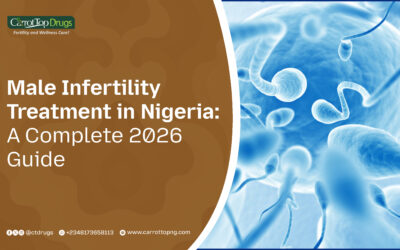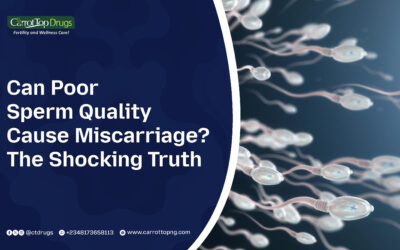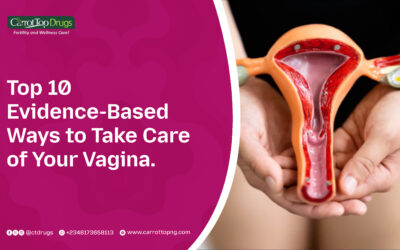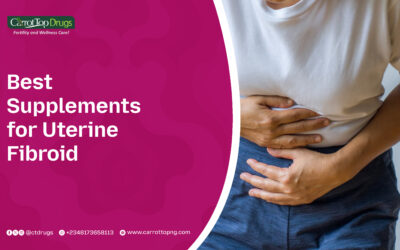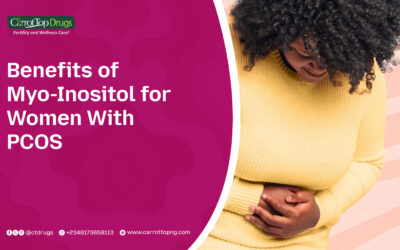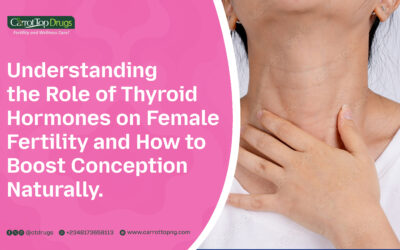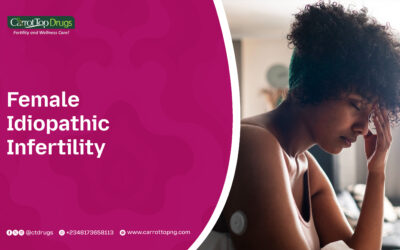Ovulation is the release of an egg from a woman’s ovary. This typically occurs mid-way into each menstrual cycle. The egg released during ovulation can be fertilized by sperm, and result in a pregnancy. If an egg is not released from the ovary, conception cannot occur. Ovulation disorders are one of the major causes of infertility in women. Here are 5 possible reasons why some women do not ovulate properly.
Prevalence of Ovulation Disorders In Women
According to research conducted by the World Health Organization, about 25% of female infertility can be traced to ovulatory problems. In Nigeria, ovarian problems account for about 13% of the causes of female infertility. Chinyere Blessing Akpata et al., conducted research and discovered that Polycystic ovarian syndrome is the most common cause of ovulatory problems and about 13.8% of women are diagnosed to have PCOS.
Causes of Ovulation Disorders in Women
From the statistics above, several women are struggling with infertility because of ovulatory disorders. Here are the top causes of ovulation disorders.
1. Polycystic Ovarian Syndrome:
Polycystic Ovary Syndrome (PCOS) stands out as a primary contributor to ovulation disorders in women. This hormonal imbalance affects the ovaries and is a common condition among those of reproductive age. PCOS is a leading cause of ovulation disorders, disrupting the normal release of eggs from the ovaries, and it plays a significant role in female fertility challenges.
Understanding PCOS:
PCOS is characterized by various symptoms, with irregular ovulation being a key feature. Women with PCOS often experience infrequent or absent menstrual periods, indicating disruptions in the regular ovulatory cycle. The ovaries of individuals with PCOS may develop small fluid-filled sacs, commonly referred to as cysts, which can affect the release of eggs.
Ovulation Disorders and Hormonal Imbalance:
The link between PCOS and ovulation disorders lies in the hormonal imbalances associated with the condition. Elevated levels of androgens, which are male hormones, and insulin resistance are common features of PCOS. These imbalances can interfere with the normal hormonal signals that trigger ovulation, leading to irregular or absent ovulation. As a result, women with PCOS often face challenges in achieving pregnancy.
Impact on Fertility:
Ovulation disorders caused by PCOS contribute significantly to fertility issues. The irregular release of eggs makes it difficult for women with PCOS to conceive naturally. Understanding the connection between PCOS and ovulation disorders is crucial for those seeking to address fertility concerns. There is a need for targeted interventions that would stimulate ovulation and improve the chances of conception.
Diagnosis and Symptoms:
Diagnosing PCOS involves considering a combination of symptoms, including irregular menstrual cycles, signs of androgen excess (such as acne and hirsutism), and ultrasound findings of polycystic ovaries. Ovulation disorders become evident through the irregularity or absence of menstrual periods, highlighting the need for a comprehensive evaluation by a healthcare professional.
2. Hyperprolactinemia
Hyperprolactinemia refers to the condition characterized by elevated levels of prolactin, a hormone produced by the pituitary gland. Prolactin plays a key role in lactation and the menstrual cycle. When prolactin levels are abnormally high in non-pregnant and non-lactating women, it can lead to disturbances in the menstrual cycle, commonly associated with ovulation disorders.
How Hyperprolactinemia Causes Ovulation Disorders:
In the context of ovulation disorders, hyperprolactinemia can disrupt the delicate hormonal balance required for the menstrual cycle. Prolactin inhibits the secretion of gonadotropin-releasing hormone (GnRH), a crucial hormone that stimulates the release of follicle-stimulating hormone (FSH) and luteinizing hormone (LH). These hormones are essential for the development and release of mature eggs from the ovaries during ovulation. When hyperprolactinemia suppresses GnRH, it interferes with the normal ovulation process, contributing to ovulation disorders.
Women experiencing ovulation disorders due to hyperprolactinemia may notice irregular menstrual cycles, skipped periods, or complete absence of menstruation. Additionally, the elevated levels of prolactin can impact the production of other reproductive hormones, further exacerbating ovulatory dysfunction.
Diagnosis of Hyperprolactinemia as a Cause of Ovulation Disorders:
Diagnosing hyperprolactinemia as a contributor to ovulation disorders typically involves a blood test to measure prolactin levels. Elevated prolactin levels, especially in the absence of pregnancy or breastfeeding, can indicate hyperprolactinemia. Imaging studies, such as magnetic resonance imaging (MRI) of the pituitary gland, would identify any tumors or abnormalities that could be causing the excess prolactin production.
When assessing ovulation disorders, healthcare providers consider hyperprolactinemia as one of the potential causes, especially in cases where menstrual irregularities and fertility challenges are present.
Symptoms of Hyperprolactinemia
- Irregular Menstrual Periods: Women with hyperprolactinemia often experience changes in their menstrual cycles. This can include irregular periods, infrequent menstruation, or even the absence of menstruation (amenorrhea). These disruptions are closely linked to the hormonal imbalances caused by elevated prolactin levels.
- Galactorrhea: Galactorrhea is the spontaneous production of breast milk in women who are not pregnant or breastfeeding. Elevated prolactin levels can stimulate milk production, leading to nipple discharge. This symptom is more common in severe cases of hyperprolactinemia.
- Infertility: Hyperprolactinemia can interfere with the normal functioning of the reproductive system, potentially causing difficulties in conceiving. The disruption of the menstrual cycle and ovulation can contribute to infertility.
- Decreased Libido: Changes in sexual desire, including a decrease in libido or interest in sexual activities, may occur with elevated prolactin levels. The hormonal imbalances associated with hyperprolactinemia can impact sexual function.
- Vaginal Dryness and Pain During Intercourse: Hormonal disruptions caused by hyperprolactinemia may lead to changes in vaginal lubrication, resulting in dryness. This can contribute to discomfort or pain during sexual intercourse.
Primary Line of Treatment for Hyperprolactinemia-Related Ovulation Disorders:
The primary goal of treating hyperprolactinemia-induced ovulation disorders is to normalize prolactin levels. Medications like dopamine agonists, such as bromocriptine or cabergoline, are commonly prescribed. These drugs work by stimulating dopamine receptors, which, in turn, inhibit prolactin production. By reducing prolactin levels, the hormonal balance necessary for regular ovulation is restored, addressing the underlying cause of ovulation disorders.
3. Premature Ovarian Failure:
Primary Ovarian Failure (POF), also known as premature ovarian insufficiency or early menopause, is a condition in which the ovaries cease to function properly before the age of 40. In POF, the normal ovarian reserve, which includes the quantity and quality of eggs, is significantly diminished. This condition can have profound effects on a woman’s reproductive health, leading to disruptions in the ovulation process.
Symptoms:
The symptoms of primary ovarian failure can vary among individuals but often include:
- Irregular Menstrual Cycles: Women with POF commonly experience irregular or absent menstrual periods due to the disruption of the ovulatory process.
- Hot Flashes: Fluctuations in hormone levels, particularly a decline in estrogen, can lead to hot flashes, causing sudden feelings of warmth, flushing, and perspiration.
- Vaginal Dryness: Changes in hormonal levels may result in decreased vaginal lubrication, leading to discomfort or pain during sexual intercourse.
- Mood Changes: Hormonal imbalances associated with POF can contribute to mood swings, irritability, and feelings of anxiety or depression.
- Decreased Libido: Changes in hormonal levels can affect sexual desire, leading to a decrease in libido.
How Primary Ovarian Failure Causes Ovulation Disorders:
Ovulation disorders associated with primary ovarian failure stem from the compromised ability of the ovaries to release mature eggs. Ovulation is a complex process influenced by hormonal signals, and the depletion of the ovarian reserve in POF directly impacts this delicate balance. With fewer viable eggs available, the normal hormonal feedback mechanisms are disrupted, leading to irregular or absent ovulation.
The ovaries, typically responsible for producing estrogen and progesterone during the menstrual cycle, struggle to maintain the necessary hormonal levels for proper ovulation. The diminished ovarian reserve in POF not only affects the quantity of eggs but also contributes to imbalances in follicle-stimulating hormone (FSH) and luteinizing hormone (LH), both critical for the ovulatory process. As a result, women with primary ovarian failure may experience irregular menstrual cycles, anovulation (lack of ovulation), or complete cessation of menstruation.
Diagnosis of Primary Ovarian Failure as a Cause of Ovulation Disorders:
Diagnosing primary ovarian failure involves assessing the ovarian reserve through tests such as hormonal assays and imaging studies. Elevated levels of FSH and LH, along with low levels of estrogen, are indicative of ovarian dysfunction. Additionally, the absence of regular menstrual cycles and the presence of symptoms associated with hormonal changes contribute to the diagnosis of POF as a cause of ovulation disorders.
Treatment and Management:
Addressing ovulation disorders linked to primary ovarian failure often requires a comprehensive approach. While POF itself may not be reversible, management strategies aim to alleviate associated symptoms and provide reproductive support. Hormone replacement therapy (HRT) is a common treatment to supplement deficient estrogen levels, helping to regulate the menstrual cycle and alleviate symptoms such as hot flashes and vaginal dryness.
This is also known as primary ovarian insufficiency. It is the loss of normal function of the ovaries before a woman reaches the age of 40 years. If the ovaries fail, they will not produce normal amounts of the hormone oestrogen and this will make it very difficult to ovulate properly.
4. Poor Egg Quality:
Poor egg quality refers to the compromised health and viability of a woman’s eggs (ova). In the context of ovulation disorders, poor egg quality can significantly impact fertility. The quality of eggs is vital for successful conception and embryonic development. Ovulation disorders related to poor egg quality are characterized by difficulties in achieving a healthy and successful pregnancy.
Symptoms:
The symptoms associated with ovulation disorders caused by poor egg quality are often subtle and may include:
- Difficulty Conceiving: Women with poor egg quality may experience challenges in conceiving, even with regular unprotected intercourse.
- Recurrent Miscarriages: Poor egg quality increases the risk of miscarriages, and women may face repeated pregnancy losses.
- Advanced Maternal Age: While not a symptom per se, advanced maternal age is a risk factor for poor egg quality. Women over the age of 35 may be more prone to this condition.
How Poor Egg Quality Causes Ovulation Disorders:
Ovulation disorders linked to poor egg quality arise from the compromised ability of eggs to undergo successful fertilization and early embryonic development. The quality of eggs is influenced by factors such as age, genetics, and environmental influences. As a woman ages, the number of eggs decreases, and those remaining may have a higher likelihood of genetic abnormalities.
During ovulation, when an egg is released from the ovary, it needs to be of sufficient quality to be fertilized by sperm and form a healthy embryo. Poor egg quality can result in eggs that are less viable, reducing the chances of successful fertilization or leading to the development of embryos with chromosomal abnormalities. This can result in failed pregnancies or miscarriages.
Diagnosis of Poor Egg Quality as a Cause of Ovulation Disorders:
Diagnosing ovulation disorders associated with poor egg quality often involves fertility assessments and reproductive testing. Fertility specialists may conduct ovarian reserve testing, which assesses the quantity and quality of a woman’s eggs. Additionally, advanced imaging technologies such as ultrasound or hysterosalpingography may be used to evaluate the overall health of the reproductive organs.
Treatment and Management:
Addressing ovulation disorders related to poor egg quality can be challenging, and treatment options may vary based on individual circumstances. In many cases, assisted reproductive technologies such as in vitro fertilization (IVF) are considered. During IVF, eggs are retrieved directly from the ovaries, and fertilization occurs in a laboratory setting. Preimplantation genetic testing may also be utilized to identify embryos with chromosomal abnormalities, increasing the chances of a successful pregnancy.
Lifestyle modifications, including maintaining a healthy diet, regular exercise, and avoiding certain environmental toxins, may contribute to overall reproductive health. While poor egg quality is often associated with aging, women of all ages may face this challenge, and personalized treatment plans are essential for optimal outcomes.
5. Hormonal Imbalance:
Hormonal imbalance refers to disruptions in the normal levels of reproductive hormones crucial for the menstrual cycle and ovulation. In the context of ovulation disorders, hormonal imbalance can significantly impact the intricate interplay of hormones, leading to irregularities in the ovulation process.
Symptoms:
Symptoms of ovulation disorders caused by hormonal imbalance may include:
- Irregular Menstrual Cycles: Fluctuations in hormone levels can result in irregular or absent menstrual periods.
- Changes in Menstrual Flow: Hormonal imbalances may cause variations in menstrual flow, including lighter or heavier periods.
- Mood Swings: Hormonal fluctuations can contribute to mood swings, irritability, or emotional sensitivity during different phases of the menstrual cycle.
- Changes in Libido: Hormonal disturbances may impact sexual desire, leading to changes in libido.
- Unexplained Weight Changes: Hormonal imbalances can influence metabolism, potentially causing unexplained weight gain or loss.
How Hormonal Imbalance Causes Ovulation Disorders:
Ovulation disorders related to hormonal imbalance stem from disruptions in the delicate feedback mechanisms that regulate the menstrual cycle. The key hormones involved include follicle-stimulating hormone (FSH), luteinizing hormone (LH), estrogen, and progesterone. Any imbalance in these hormones can affect the development and release of eggs from the ovaries.
For instance, elevated levels of androgens (male hormones) or imbalances in insulin levels can lead to conditions such as Polycystic Ovary Syndrome (PCOS). PCOS is characterized by hormonal irregularities that interfere with the normal ovulation process. Conversely, insufficient production of thyroid hormones or imbalances in prolactin levels can also disrupt ovulation.
Diagnosis of Hormonal Imbalance as a Cause of Ovulation Disorders:
Diagnosing ovulation disorders associated with hormonal imbalance involves comprehensive hormonal assessments through blood tests. Measurement of FSH, LH, estrogen, progesterone, thyroid hormones, and prolactin levels helps identify irregularities in the hormonal milieu. Additionally, imaging studies may be conducted to evaluate the health of the reproductive organs and identify any structural abnormalities.
Treatment and Management:
The management of ovulation disorders linked to hormonal imbalance often focuses on addressing the underlying hormonal irregularities. Treatment options may include:
- Hormone Therapy: Hormone replacement therapy (HRT) or medications to regulate specific hormones can restore balance and promote regular ovulation.
- Lifestyle Modifications: Adopting a healthy lifestyle, including a balanced diet, regular exercise, and stress management, can contribute to hormonal balance.
- Treatment of Underlying Conditions: Managing conditions such as PCOS, thyroid disorders, or insulin resistance can help regulate hormones and improve ovulatory function.
- Assisted Reproductive Technologies (ART): In cases where conservative measures are insufficient, ART such as in vitro fertilization (IVF) may be considered to bypass ovulatory challenges.
Regular monitoring and adjustments to treatment plans are crucial for optimizing outcomes and addressing the dynamic nature of hormonal balance.
Our Recommendation
For women struggling with poor egg quality, we recommend Evergreen Eggboost for Women and Evergreen Formula for Women.
Evergreen EggBoost for Women boosts the maturity of quality eggs, thus, influencing ovulation. This also greatly increases the chances of fertilization and successful conception. These supplements work hand-in-hand to ensure that a woman’s ovulation disorders are resolved.
Evergreen Formular for Women is a potent fertility booster. It improves hormonal balance in women. It is recommended in the treatment of menstrual disorders, painful menstruation as well and conditions linked to hormonal imbalance such as irregular menstruation, anovulation, PCOS (Polycystic Ovarian Syndrome), and abnormal lactation caused by hyperprolactinemia.
EVERGREEN FORMULAR FOR WOMEN ensures regular menstruation and ovulation and promotes overall reproductive well-being. It also provides full anti-oxidant support and fully optimizes the female reproductive system for pregnancy to occur naturally.



